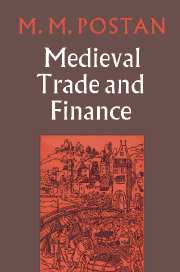Book contents
- Frontmatter
- Preface
- Acknowledgements
- Contents
- 1 Credit in medieval trade
- 2 Private financial instruments in medieval England
- 3 Partnership in English medieval commerce
- 4 The trade of medieval Europe: the North
- 5 The economic and political relations of England and the Hanse from 1400 to 1475
- 6 Economic relations between eastern and western Europe
- 7 Italians and the economic development of England in the Middle Ages
- 8 The medieval wool trade
- 9 English studies of the customs accounts
- Index
3 - Partnership in English medieval commerce
Published online by Cambridge University Press: 15 December 2009
- Frontmatter
- Preface
- Acknowledgements
- Contents
- 1 Credit in medieval trade
- 2 Private financial instruments in medieval England
- 3 Partnership in English medieval commerce
- 4 The trade of medieval Europe: the North
- 5 The economic and political relations of England and the Hanse from 1400 to 1475
- 6 Economic relations between eastern and western Europe
- 7 Italians and the economic development of England in the Middle Ages
- 8 The medieval wool trade
- 9 English studies of the customs accounts
- Index
Summary
Societas in its various forms has always been a favourite topic with historians of medieval trade. Considering how important partnerships were in the organisation and finance of commerce, and how abundant is the historical literature dealing with them, it is surprising to find the subject almost wholly by-passed by English economic historians. Even Sir William Ashley, who was well-acquainted with the medieval Societas and fully aware of its importance, described it with hardly a reference to English doctrine and practice. As we shall see further, the obscurities of English medieval law and terminology are largely to blame for the silence of modern historians. But whatever its explanation, the silence does not mean that in this respect the practice of English merchants in the Middle Ages was fundamentally at variance with that of Italian or German or Flemish traders. For, looked at more closely, English records reveal the partnership and societas-like associations operating and covering a range of transactions as wide as that which the societas embraced abroad; fulfilling roughly the same functions and appearing in roughly the same forms.
To some extent, however, this gap in English historical literature is the fault not of English historians, but of the continental students of societas. The parallels between English and continental developments might not have escaped attention had continental practice and doctrine been presented in the shape recognisable by English lawyers and economists.
- Type
- Chapter
- Information
- Mediaeval Trade and Finance , pp. 65 - 91Publisher: Cambridge University PressPrint publication year: 1973
- 6
- Cited by



